Introduction
Hey there! Have you heard about these new “Education GPTs”? With the recent launch of the GPT Store in 2024, the landscape has become even more exciting!
I’ve been diving into them lately, and let me tell you, they’re pretty fascinating. It’s like having a little tech assistant right in your classroom, now with even more specialized options thanks to the GPT Store’s diverse offerings.
Why “Education GPTs” Are Worth a Look
So, what’s the big deal with these “Education GPTs“? Imagine having a tool that can spice up your lesson plans, offer some fresh perspectives, or even help with those tricky questions students throw at us.
With the advent of the GPT Store, accessing these AI-powered buddies has become easier and more tailored to our educational needs.
They’re not just flashy gadgets; they’ve got some real substance to make our lives a bit easier and our classrooms more engaging.
I’ve rounded up a list of the “21 Best Education GPTs” out there, each with its own unique flair and now featuring selections from the GPT Store.
Whether you’re looking to jazz up your teaching methods, find new ways to reach your students, or explore the latest AI advancements, there’s probably something here that’ll catch your eye.
Let’s take a look together and see what these newfangled AI tools, enhanced by the GPT Store’s offerings, can do for us in the world of education. Trust me, it’s worth exploring!
Course Creation and Structure
Creating Structured Courses with CourseGenie.ai
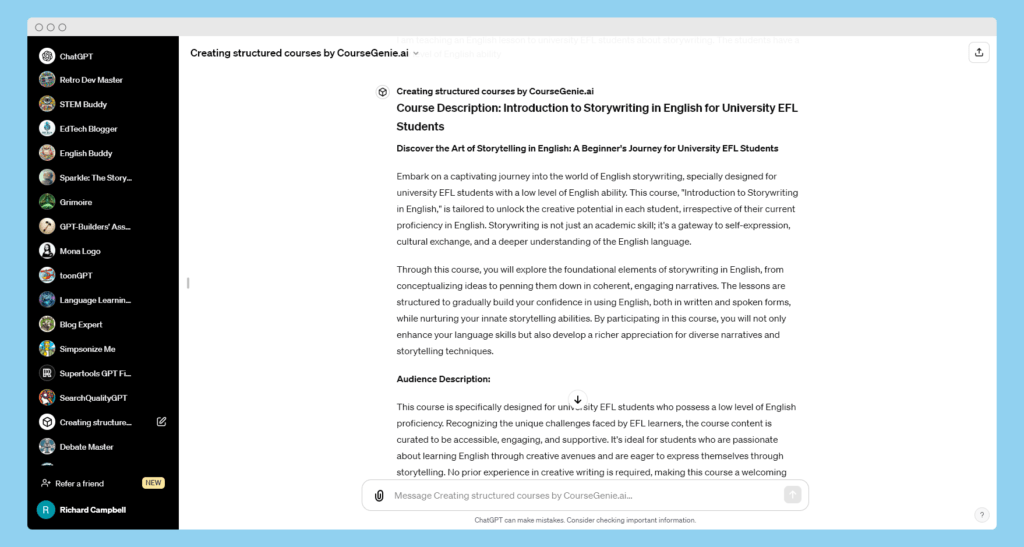
Hey, have you tried CourseGenie.ai yet? It’s this nifty tool that’s like having a personal assistant for designing your course outlines. It’s been a game-changer in how I approach lesson planning. Here’s why:
- Ease of Use: You just feed it your basic course idea, and bam! It helps you flesh out a full-fledged curriculum, complete with learning objectives and all.
- Time Saver: Seriously, it cuts down so much planning time. More time for coffee, right?
- Customizable: Whether you’re teaching Shakespeare or quantum physics, it adapts to your subject seamlessly.
David Cavanagh Online Course Creation Tool
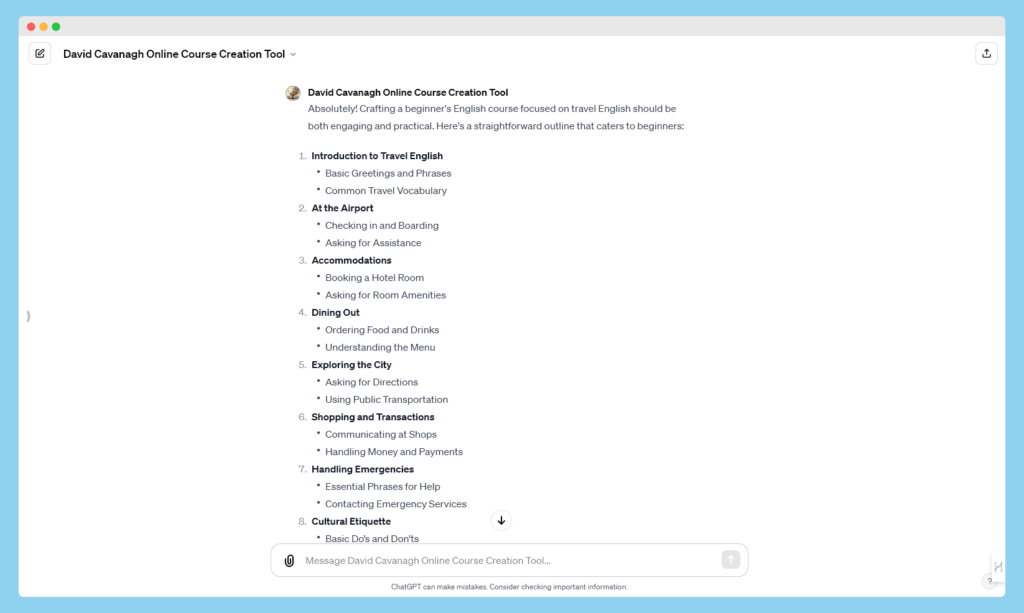
Are you thinking about creating an online course for your class or as a side hustle, but you are not sure where to start? Well David’s Cavanagh Online Course Creation Tol has your covered.
- Simplified Course Structure Design: This is crucial for teachers, especially those new to online course creation. I assist in breaking down the entire process into manageable steps, helping you design a course structure that’s clear, logical, and easy to follow. This includes organizing your course into modules and lessons in a way that makes sense for your subject matter and teaching style.
- Module Name Suggestions and Content Support: I provide suggestions for module names that are straightforward and resonate with the course’s goals. This is accompanied by support in creating the actual course content. I guide you step-by-step through the process of developing engaging lessons, choosing the right materials, and structuring your content to enhance learning and retention.
- Beginner-Friendly Approach with Regular Check-ins: My approach is tailored to be friendly to beginners, ensuring that teachers feel supported throughout their course creation journey. Regular check-ins to ensure that the content is neither too advanced nor too simple for the intended audience are a part of this process. This helps in maintaining a balance between educational depth and accessibility for a diverse audience.
Language Learning Made Easy with Richard West-Soley’s Tool
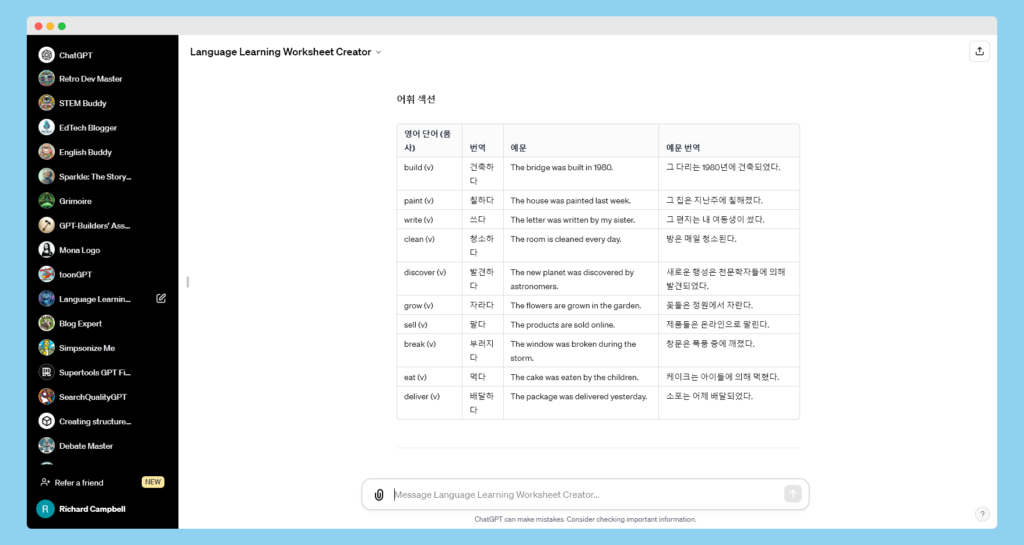
Richard West-Soley’s got this tool for language learning that’s pretty awesome. It’s not just another worksheet generator; it’s more like having a language expert sitting right next to you.
- Personalized Worksheets: It’s great for creating tailored worksheets. I used it for my Spanish class, and the kids loved the customized exercises.
- Diverse Formats: It covers everything from vocabulary to grammar, catering to different learning styles.
- Engaging for Students: My students seem more engaged since I started using it. That’s a win in my book!
Language Learning by Bailey Chittle
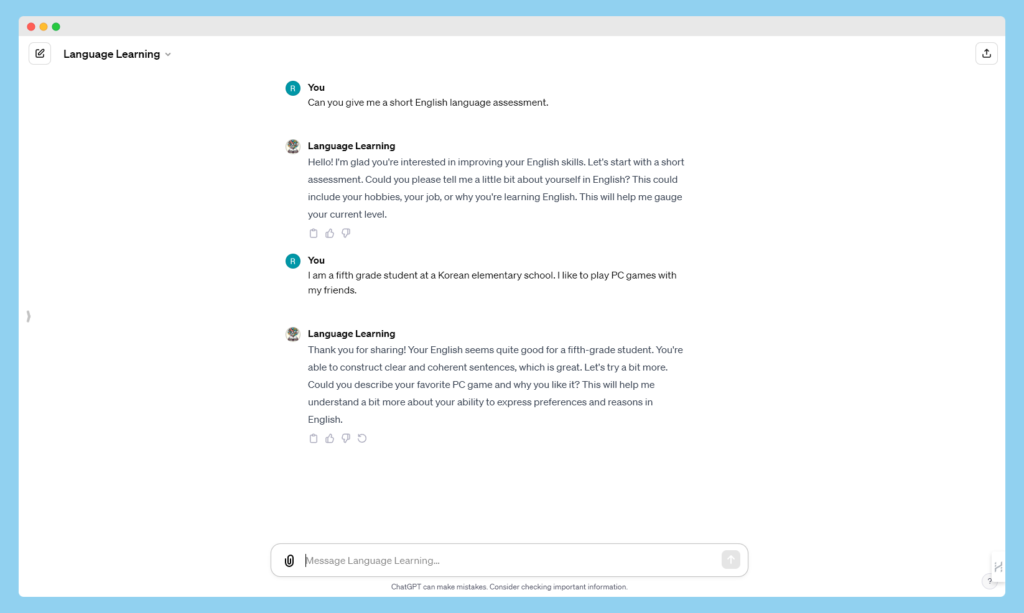
Are you struggling to learn a new language? Maybe you’re a language teacher and you would love some new ideas for activities and assignments. Language Learner by Bailey Chittle is a great language learning assistant. It’s free and super simple to get started.
- Interactive Conversations: Engage in simulated conversations tailored to your language proficiency level. This helps in practicing real-life scenarios and improving conversational skills.
- Adaptive Learning: The content adjusts to match your language proficiency, from basic vocabulary for beginners to complex grammar for advanced learners.
- Feedback and Encouragement: Receive specific feedback on your language use, with encouragement and tips for improvement to keep you motivated and on track.
Creative Learning Tools
Storytelling Reinvented with Sparkle: The Storybook Maker
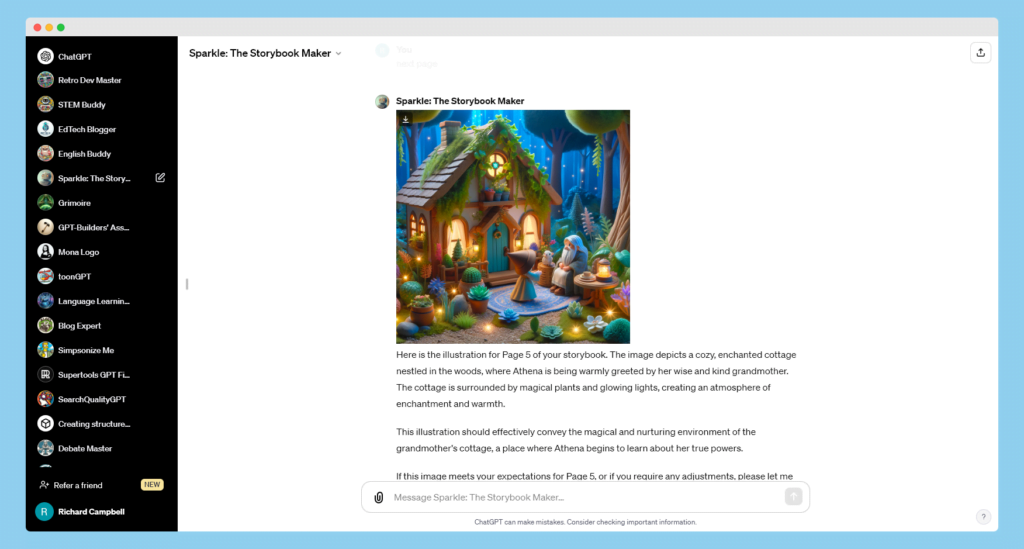
You know, I stumbled upon this gem called Sparkle: The Storybook Maker. As an English professor teaching in Korea, finding ways to engage students in creative storytelling can be quite a challenge. Sparkle has been a lifesaver in this regard.
- Creative Story Development: It’s incredible for brainstorming story ideas. I had my students create their own storybooks as a project, and the quality of their work just soared.
- Character and Scene Inspiration: Especially useful for students who struggle with creative blocks. It gives them a nudge with character ideas and scene settings, making their stories more vivid and engaging.
Debating Skills with Debate Master by Andrew Gao
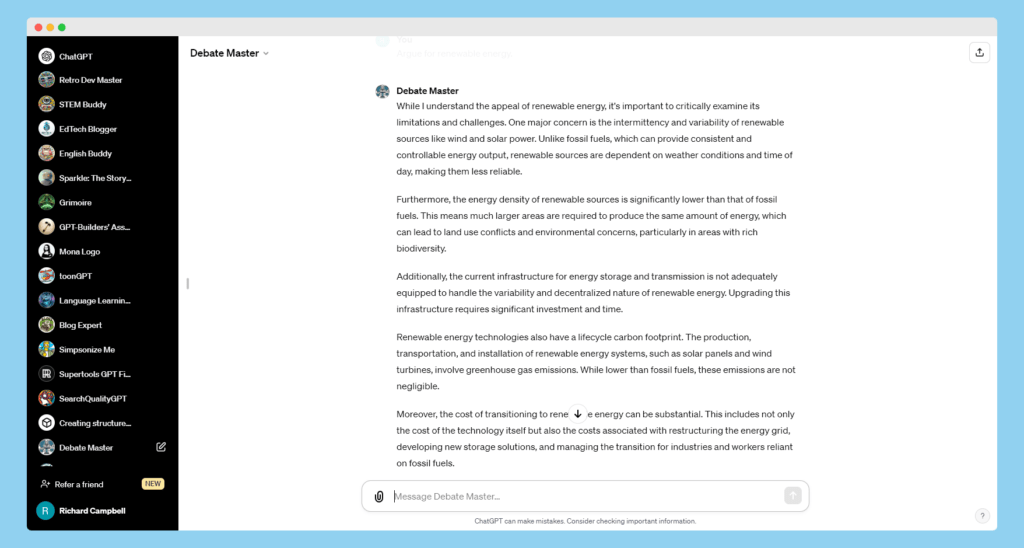
Then there’s Debate Master by Andrew Gao—a real breakthrough for my English debate classes. It’s not just about arguing points; it’s about crafting a well-thought-out argument, which is crucial for language learners.
- Building Arguments: It helps students structure their thoughts coherently. I’ve seen a noticeable improvement in their debate preparations.
- Fact-Checking Aid: In an era of misinformation, teaching students to fact-check is vital. This tool offers a great way to integrate critical thinking into their debates.
- Professional Demeanor Tips: It even guides on maintaining decorum during debates, which is essential in any language learning environment.
EduCraft Pro with Creative Writing Coach
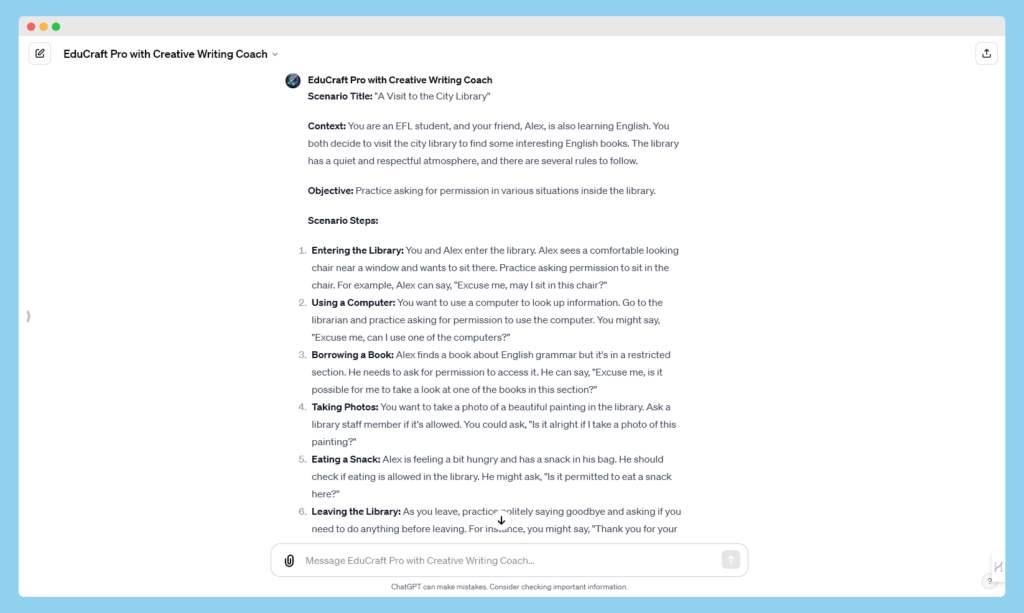
As an English Language professor I spend a lot of time updating the role-plays in our textbooks. With EduCraft Pro I can create specific role-plays and scenarios to meet the needs of my studentsat all abilitiy levels with ease.
- Comprehensive Course Content Development: Enables teachers to design engaging eLearning experiences with structured course objectives, learning components, and assessments, as exemplified in the “Design Your Own Ring (DYOR)” course.
- Scenario-Based Learning and Role Play: Offers immersive learning through practical scenarios and role-playing activities, enhancing students’ problem-solving and decision-making skills, particularly effective in training contexts like sales.
- Interactive Knowledge Checks and Assessments: Incorporates quizzes and assessments to measure student understanding and engagement, allowing teachers to provide timely feedback and adjust teaching strategies.
Personalized Learning Assistance
Tailored Book Recommendations with Book Scout by Moritz Stellmacher
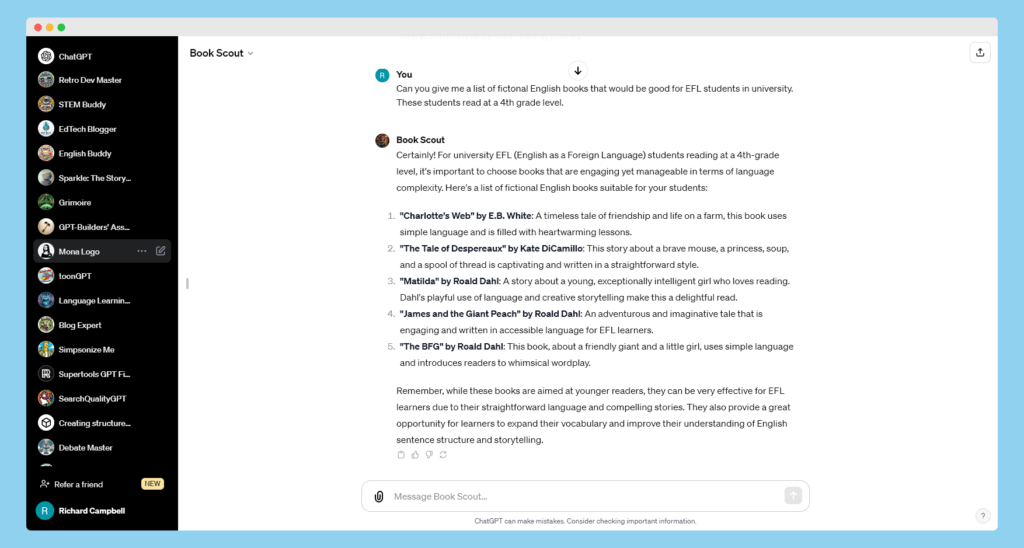
Have you ever faced the challenge of recommending books to students that match their specific interests and language proficiency levels? That’s where Book Scout comes into play.
- Customized Reading Lists: It’s a handy tool for suggesting books that cater to the diverse tastes of my English learners here in Korea. Whether it’s contemporary fiction or classic literature, Book Scout helps me tailor recommendations perfectly.
- Language Level Matching: What I appreciate most is how it aligns book choices with the students’ English proficiency. It’s been a great way to encourage reading without overwhelming them.
Enhanced Study Aids with AlphaNotes GPT by davideai.dev
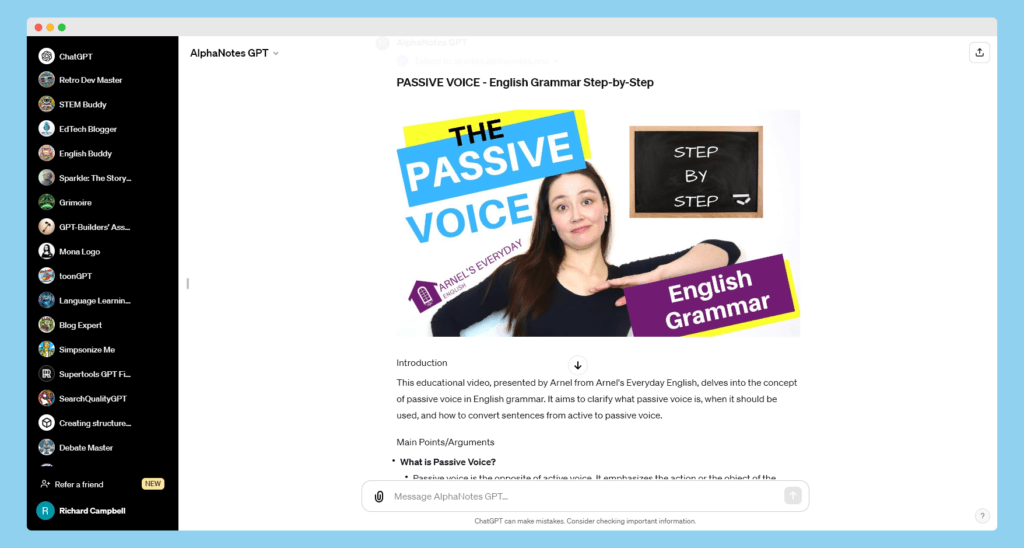
AlphaNotes GPT has revolutionized the way I provide supplementary materials for my lectures. It analyzes educational content and distills it into concise, digestible notes.
- Efficient Content Summarization: After a lecture on complex topics like English literary analysis, AlphaNotes GPT helps me create clear summaries for my students to review.
- Support for Various Media: It’s not just about text; this tool can process information from different media formats, making it easier to integrate various learning resources.
- Interactive Learning: It also generates interactive content, like quizzes, which is fantastic for reinforcing the concepts discussed in class.
Video Summarizer AI By Klym Zhuravlov-Iuzefovych
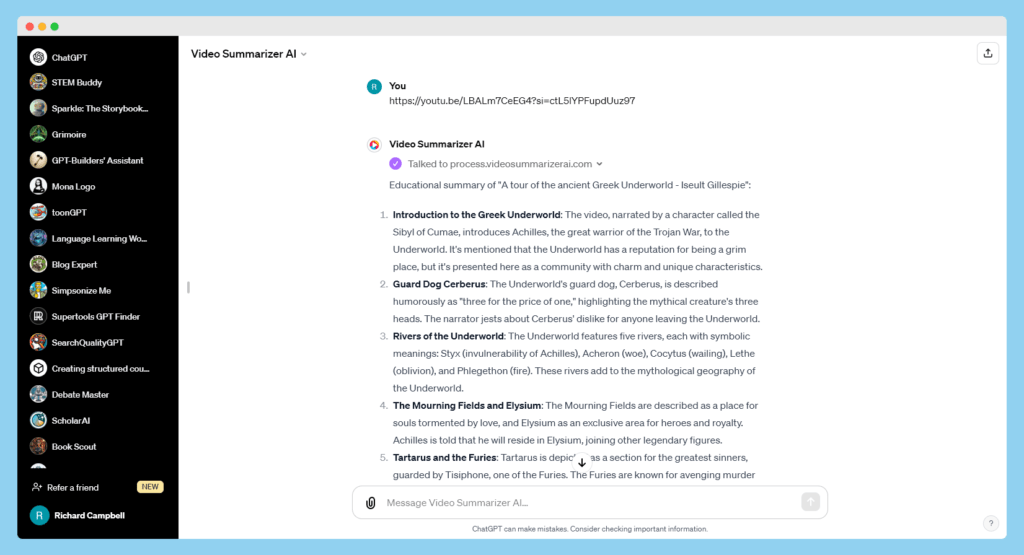
I often rely on YouTube for supplementing lessons for my unversity and K-12 students. However, it can be tough to spend the needed time to watch hundreds of hours of educational videos.
Video Summarizer AI provides educational summaries and insights based on the YouTube links I provide it. It has several useful features for the classroom or for self-studying:
- YouTube Video Analysis: Specializes in breaking down YouTube videos into sections based on their captions for in-depth analysis.
- Educational Summaries and Insights: Combines detailed summaries with insightful analyses, focusing on key themes, ideas, and notable facts or figures mentioned in the video content.
- Number Analysis and Insights: When numbers are present in video captions, additional insights are generated through analysis and contextualization.
- Multi-Language Support: Offers responses in various languages, catering to a diverse user base and enhancing accessibility.
- Comprehensive Research Approach: Employs a diligent search methodology, thoroughly exploring different segments of video captions to ensure a comprehensive analysis.
- Safety and Content Consideration: Maintains a commitment to avoiding discussions of explicit, harmful, or illegal content, ensuring a safe and educational user experience.
- User Interaction: Engages with users after providing a section summary, offering to explore the next section or address specific queries about the current one.
FlashcardsGenerator by Stephan Djokovic
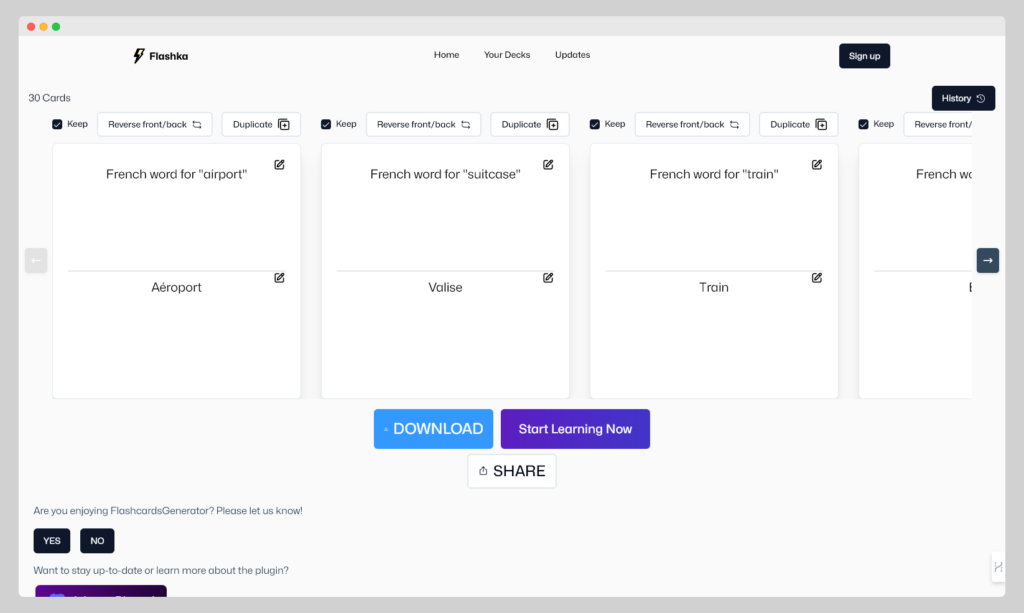
My daughter is studying at an online high school. This means she spends a lot of time creating her own studying materials. One of her favorite study tools is an old school flash card. She makes them for every subject she studies. Making these flash cards is very time consuming. Now, any AI tool can create basic flash cards. But what makes Flashcardsgenerator special is its integration with Anki flashcards, Flashka, Quizlet and more.
- It specializes in creating customized Anki flashcards, formatted for easy import into the Anki spaced repetition system.
- It generates direct, easy-to-use download links for each set of flashcards, enhancing the user experience.
- It has the capability to integrate images into flashcards by utilizing other plugins, thus adding a visual component to the learning material.
Interactive and Engaging Learning Tools
Diverse Learning with ‘All-around Teacher’ by Kevin Ivery
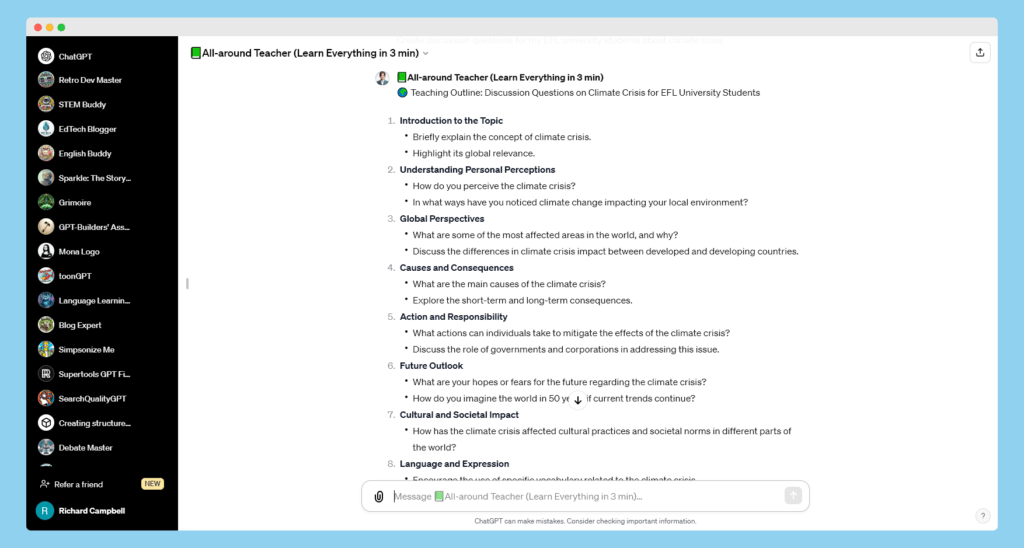
‘All-around Teacher’ by Kevin Ivery is like having a multi-talented colleague right in your pocket. It’s been a fantastic resource for my university English classes in Korea, particularly when exploring diverse topics.
- Depth in Understanding: It offers insightful explanations that have added depth to my lessons on various English literature themes. The students get to explore different perspectives, making each class more enriching.
- Interactive Elements: I’ve used it to create interactive discussions, sparking lively debates among students on topics like symbolism in modern literature. It’s great to see them engage so enthusiastically.
Homework Assistance with ‘My Excellent Classmates’ by Kevin Ivery
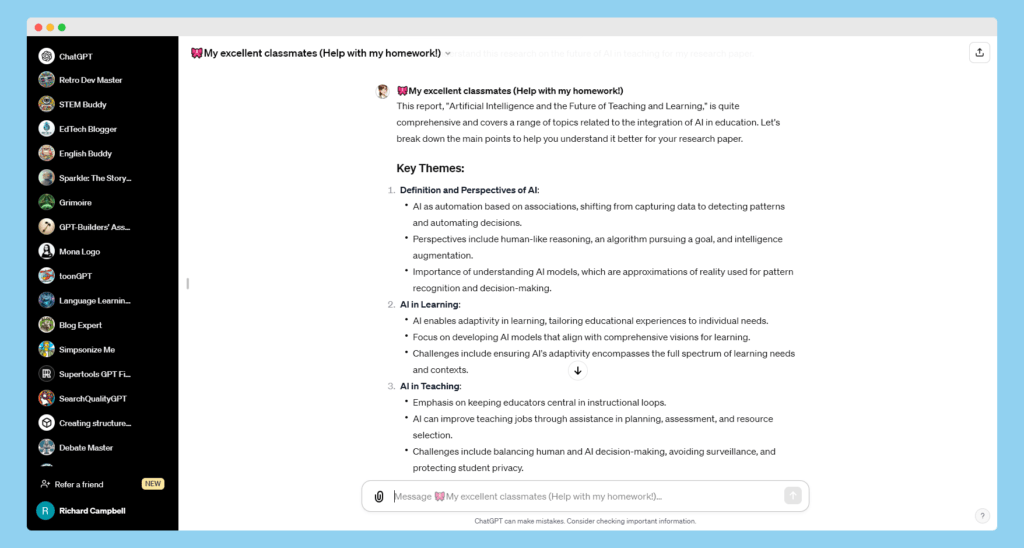
Ever wished for an assistant to help students outside class hours? ‘My Excellent Classmates‘ has been that assistant for me. It guides students through complex English language concepts and literature reviews.
- Step-by-Step Guidance: This tool has been invaluable for students working on their thesis or major projects. It breaks down complex literary theories into understandable chunks.
- Enhanced Problem-Solving: I’ve noticed a significant improvement in my students’ analytical skills. They’ve become more adept at dissecting literary texts and crafting well-structured arguments.
Specialized Educational Tools
Grammar and Vocabulary Mastery with ‘English Teacher Marion’
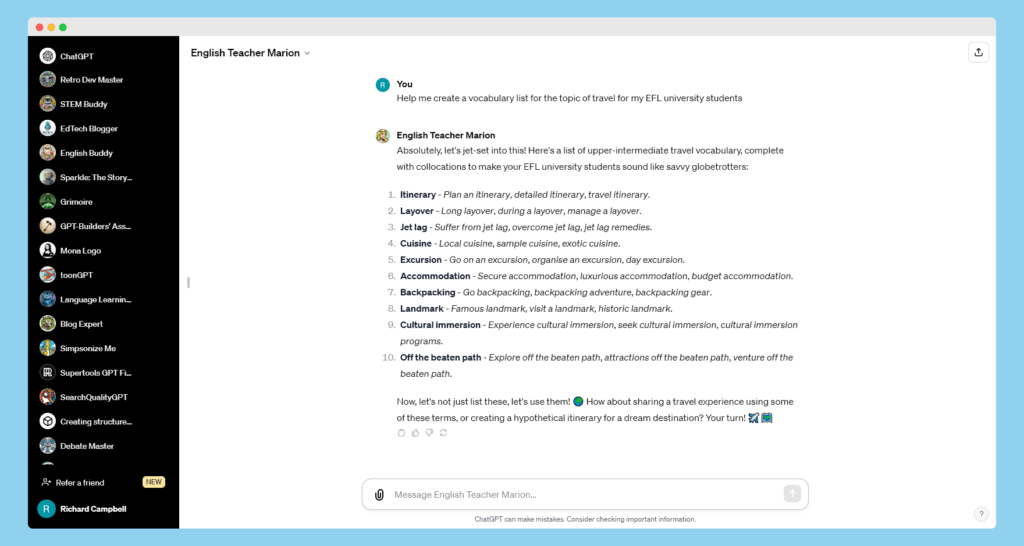
As an English professor in a Korean university, I’m always on the lookout for tools that can refine my students’ grammar and vocabulary. That’s where ‘English Teacher Marion‘ comes in.
- In-Depth Grammar Corrections: It’s been a huge help for students struggling with complex grammatical structures. The tool offers detailed corrections and explanations, making it easier for students to grasp tricky grammar rules.
- Vocabulary Expansion: It also helps in expanding students’ vocabulary, especially with idiomatic expressions and advanced terms that are essential for higher-level English proficiency.
Innovative Game-Based Learning with ‘TinyTap GameSmith’
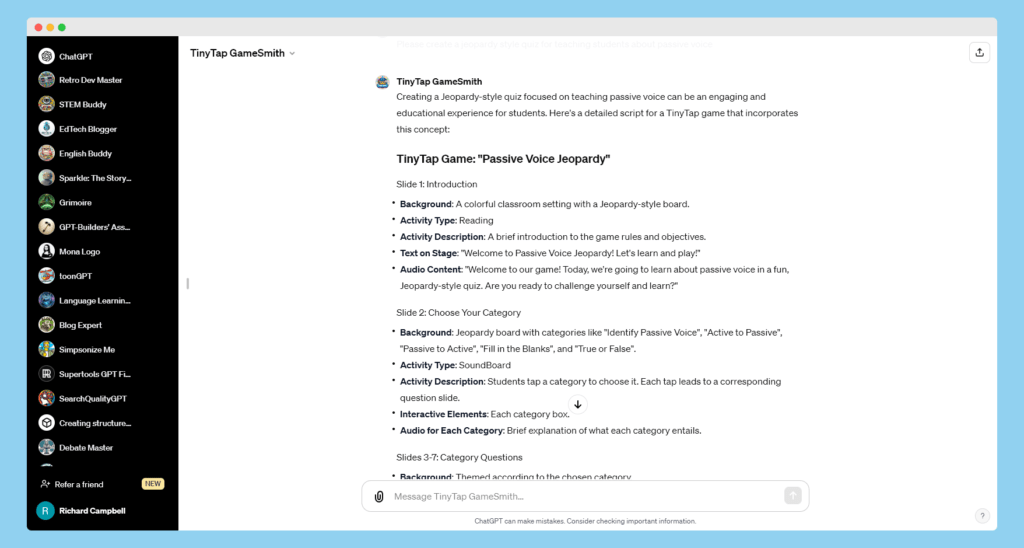
Engaging students can be challenging, especially with dry subject matter. ‘TinyTap GameSmith‘ changes the game (pun intended). It’s about turning learning into a fun, interactive experience.
- Custom Educational Games: I’ve used it to create games tailored to specific English literature themes. It’s amazing to see how a gamified approach increases student participation and retention.
- Diverse Learning Formats: Whether it’s a quiz on Shakespearean plays or a word puzzle on poetic devices, this tool makes learning English literature more enjoyable and less intimidating for students.
Adaptive and Multilingual Education
Homework Helper by YUANHENG TAO
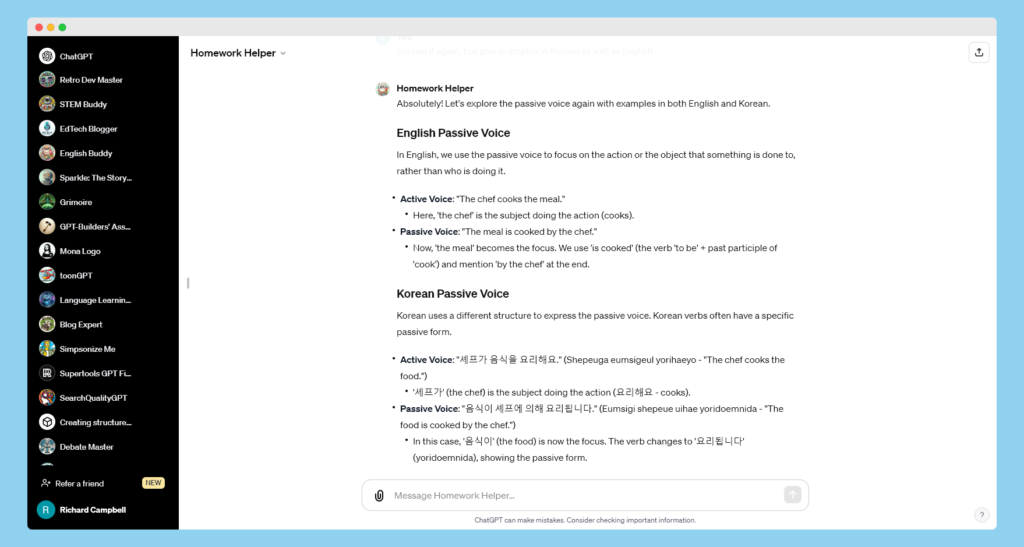
As a university English professor in Korea, I’ve discovered the immense value of ‘Homework Helper‘ by YUANHENG TAO in providing adaptive, multilingual educational assistance. This GPT has been a game-changer in addressing the diverse needs of my students.
- Multilingual Interface: It effortlessly switches to the student’s native language, making learning more accessible for my international students.
- Customized Learning: It adjusts the complexity of explanations and exercises based on the student’s age and understanding, a feature that has been invaluable for my varied classroom.
- Memory of Past Interactions: By remembering previous conversations, it offers a personalized learning experience, which has been crucial for continuous progress in language learning.
LearningLadder by Joao Alberto O Lima
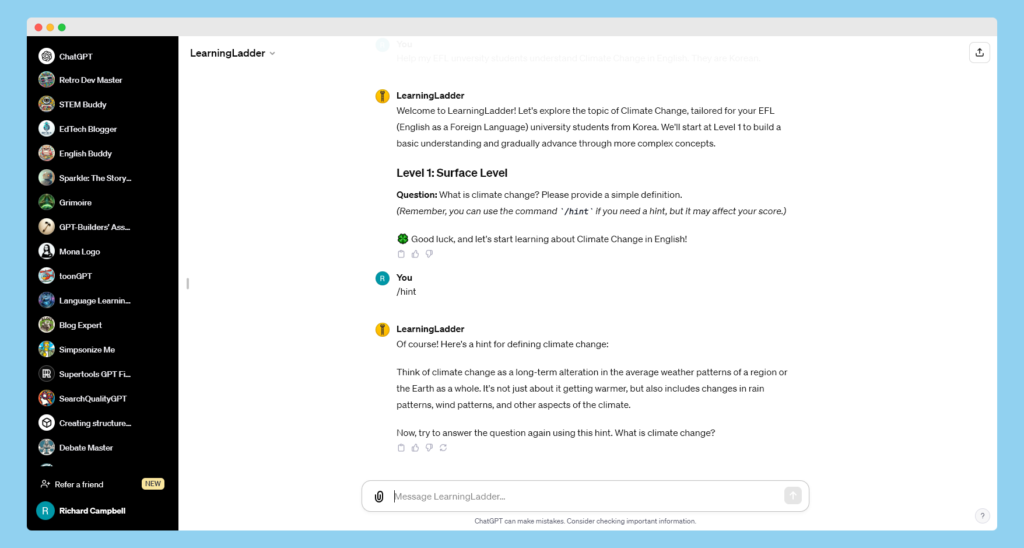
‘LearningLadder’ by Joao Alberto O Lima is another exceptional tool in my teaching arsenal, especially for fostering a deep understanding of English literature and language concepts through an interactive, gamified approach.
- Progressive Difficulty: With levels ranging from basic understanding to cutting-edge research, it perfectly aligns with my curriculum, gradually guiding students to more complex English literature concepts.
- Customizable Settings: Its ability to adapt settings such as language and evaluation criteria has made it a versatile tool in my classroom.
Innovative Teaching Aids
Teachers’ Pet by Joaquin Eduardo Bueno Ramos
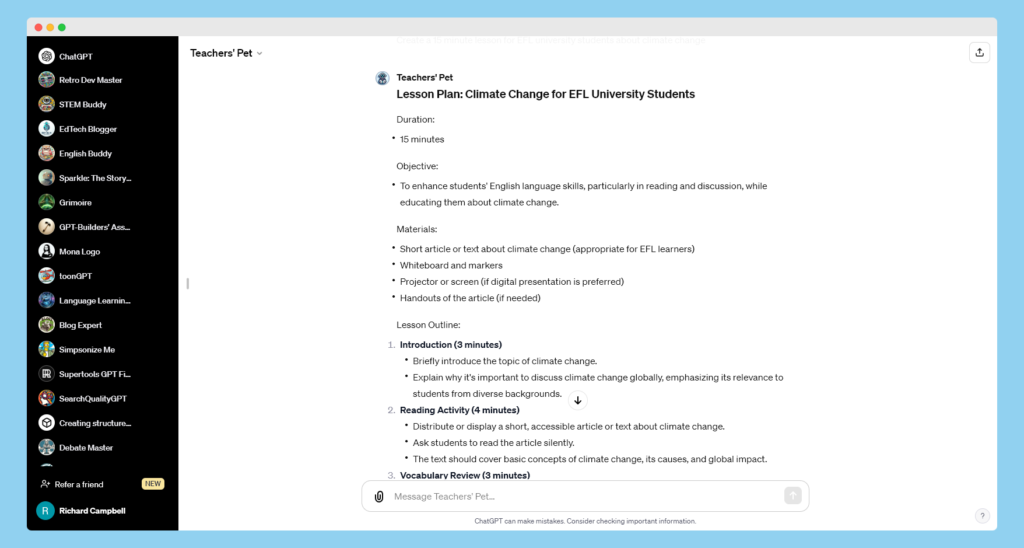
As an English professor in a Korean university, I’ve always been on the lookout for tools that can streamline the creation of educational materials. That’s where “Teachers’ Pet” comes into the picture.
- Educational Content Creation: This tool is a lifesaver for crafting lesson plans, essay questions, and even test questions, including various formats like multiple choice and true/false. It’s like having an extra set of hands during the busiest times of the semester.
- Structured Formatting: What I love about it is its ability to organize materials with clarity. It uses bullets and numbering effectively, making my teaching materials more accessible and easier for students to follow.
- Answer Key Provision: It also provides answers for test questions, which is a huge time saver during the grading process.
- Customized Study Guides: Tailoring content to specific needs like subject matter or grade level is another standout feature. It’s been particularly helpful for me in developing study guides that align with my curriculum and the specific needs of my English literature students.
- Interactive Engagement: The tool actively seeks specifics from me as an educator to ensure the content meets my exact requirements, making it a collaborative experience.
Simplifying Complex Concepts
EasyBites: Making Learning Accessible for All Ages
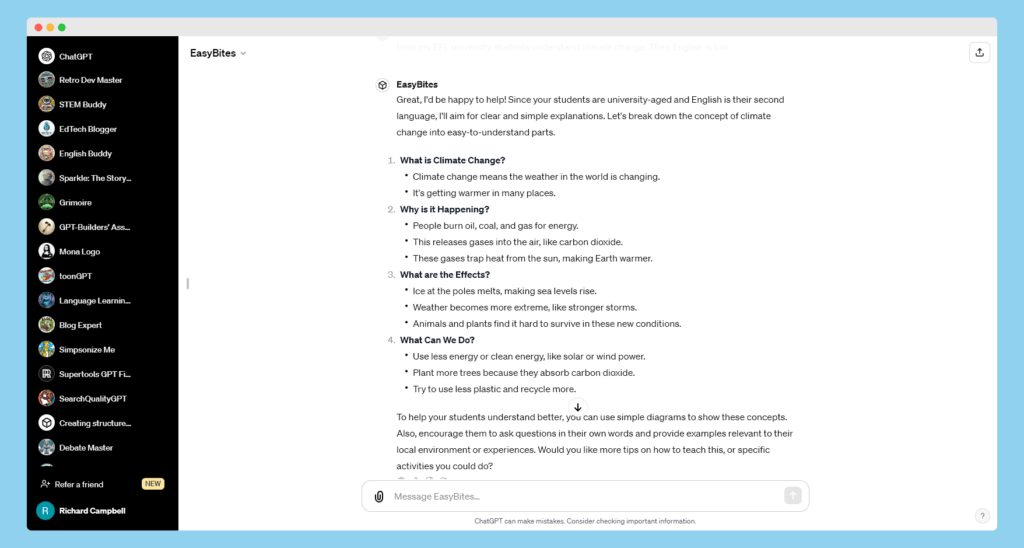
In my English literature classes at the university, I often encounter the challenge of explaining complex concepts in a way that’s easily digestible for students. “EasyBites” has been a remarkable tool in tackling this challenge.
- Expertise in Pedagogy: What stands out with EasyBites is its specialized approach in breaking down intricate literary theories into simpler, bite-sized pieces. This has been particularly helpful for my first-year students who are new to English literature.
- Age-Appropriate Responses: Although my students are university-aged, the ability of EasyBites to tailor content to different age groups means it can be a valuable resource for educators teaching various levels, from kids to adults.
- Accurate Information Delivery: In a field where accuracy is paramount, I appreciate its commitment to providing precise answers, especially when discussing nuanced aspects of English literature.
- Bias-Free Communication: It’s crucial to maintain an unbiased viewpoint in educational settings. EasyBites’ focus on avoiding bias, particularly in sensitive areas, aligns well with the ethos of an educational environment.
- Kid-Friendly Approach: While my students are older, this feature makes EasyBites an excellent recommendation for colleagues teaching younger age groups, ensuring that the content is suitable and engaging for their learners.
AI Advisor for Teachers and Educators
AI EduGuide by Allison McCrary
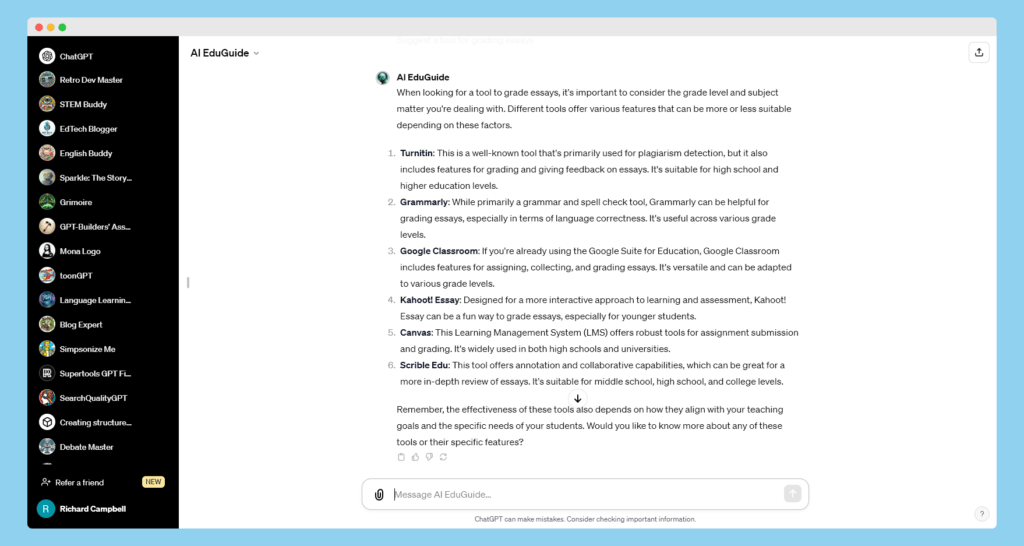
Navigating the complexities of teaching English literature at a Korean university, I’ve found “AI EduGuide” to be an invaluable ally. Allison McCrary designed it to provide advice and support specifically in educational settings.
- Educational Context Specialization: AI EduGuide is brilliant at providing assistance that’s directly relevant to our teaching scenarios. Whether it’s lesson planning or addressing specific literary themes, its guidance is spot on.
- Inquiry About Details: It asks for crucial details like grade level and subject matter, ensuring the support it offers is precisely what’s needed for my university students.
- Customized Recommendations: One of its strengths is the ability to provide recommendations and strategies that are not just general but customized to the unique needs of my English literature classes.
- Versatile in Topics: From Shakespeare to contemporary Korean literature in translation, this tool can handle a wide range of subjects, making it a versatile assistant in my teaching toolkit.
- Resource Identification: It’s also adept at suggesting relevant resources and tools, which has helped me enhance my teaching materials.
- Multilingual Capabilities: For a university with a diverse student body, its multilingual capabilities make it more accessible for students who are non-native English speakers.
LearnSphere by Rodrigo Maciel
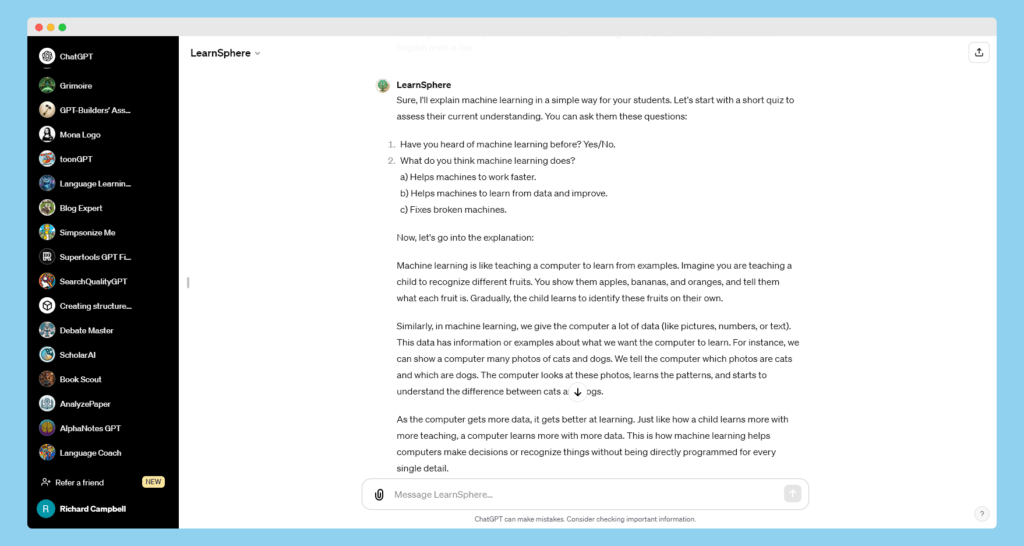
Another tool that has changed the way I approach teaching is “LearnSphere,” which Rodrigo Maciel created. It’s designed to prioritize active learning, which is essential to keeping university students engaged and invested in their literature studies.
- Active Learning Focus: It encourages students to engage deeply with the topics, making learning more interactive and less passive.
- Tailored Content: The tool adapts its content based on the students’ existing knowledge and interests, which is incredibly useful for catering to a class with varying levels of familiarity with English literature.
- Educational Summaries and Explanations: It provides concise and clear summaries and explanations, helping students grasp complex literary concepts more easily.
- Interactive Activities Suggestions: From suggesting relevant projects to literary analysis games, LearnSphere keeps my students actively involved and reinforces their learning.
- Critical Thinking Encouragement: It’s not just about memorizing facts; the tool aims to challenge assumptions and promote critical thinking, aligning perfectly with the higher-order thinking skills crucial in higher education.
- Quiz-Based Assessments: Starting interactions with quizzes helps gauge students’ understanding, allowing me to tailor discussions and lectures more effectively.
Conclusion: Embracing the Future of Education with GPTs
As we wrap up our exploration of the “15 Best Education GPTs,” it’s clear that the landscape of teaching, especially in higher education like at our university in Korea, is undergoing a significant transformation. Tools like “AI EduGuide,” “LearnSphere,” and others are not just novelties; they represent a pivotal shift in how we approach education in the 21st century.
The Impact of GPTs in Education
- Personalized Learning: These tools have enabled a level of personalization in teaching English literature that was previously unattainable. Each student’s unique learning style and needs can now be addressed more effectively, ensuring a more inclusive and comprehensive educational experience.
- Efficiency and Engagement: The efficiency in creating educational content and the ability to engage students in interactive ways have been game-changers. From simplifying complex concepts to providing multilingual support, GPTs have made learning more accessible and enjoyable.
- Empowering Educators: As an educator, I’ve found these tools to be empowering. They’ve allowed me to focus more on the nuances of teaching and less on the administrative aspects of education. This shift has led to a richer, more fulfilling teaching experience for both me and my students.
Looking Ahead
The future of education is bright with the integration of GPTs. As we continue to embrace these technologies, we can expect to see even more innovative approaches to teaching and learning. The key will be to remain open to new possibilities and to integrate these tools in ways that enhance, rather than replace, the irreplaceable human elements of teaching.
A Call to Fellow Educators
I encourage my fellow educators to explore these “Education GPTs.” Whether you’re teaching English literature in Korea or any other subject around the world, there’s a GPT out there that can enhance your teaching methods and enrich your students’ learning experiences. Let’s step into this new era of education together, armed with the best tools to make learning more effective, engaging, and enjoyable for all.
FAQs on Education GPTs
What are Education GPTs and how do they differ from regular AI tools?
Education GPTs are specialized AI tools designed for teaching and learning purposes. Unlike regular AI tools, they focus on educational content creation, personalized learning, and interactive teaching methods, making them more suited for academic environments.
Can Education GPTs be used for teaching English literature to non-native speakers?
Absolutely! Many Education GPTs offer multilingual capabilities and tailor content according to language proficiency levels, making them ideal for teaching English literature to non-native speakers.
How can Education GPTs enhance interactive learning in a classroom?
Education GPTs like ‘LearningLadder’ and ‘Sparkle: The Storybook Maker’ encourage interactive learning through gamified experiences, quizzes, and storytelling, making lessons more engaging and memorable for students.
Are there any GPTs that help in creating educational content like lesson plans and quizzes?
Yes, tools like ‘Teachers’ Pet’ and ‘CourseGenie.ai’ are excellent for creating structured educational content, including lesson plans, quizzes, and study guides, tailored to specific educational needs.
Do Education GPTs support adaptive learning for students with different learning paces?
Definitely. Tools such as ‘Homework Helper’ and ‘LearningLadder’ offer adaptive learning features, adjusting the complexity and style of content based on each student’s learning pace and understanding.
Can Education GPTs assist in grading and evaluating student work?
While most Education GPTs focus on content creation and interactive learning, some like ‘Teachers’ Pet’ can assist in creating answer keys, which can streamline the grading process. However, they are more geared towards aiding teaching and learning rather than directly evaluating student work.


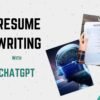

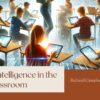
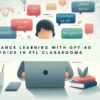



Recent Comments